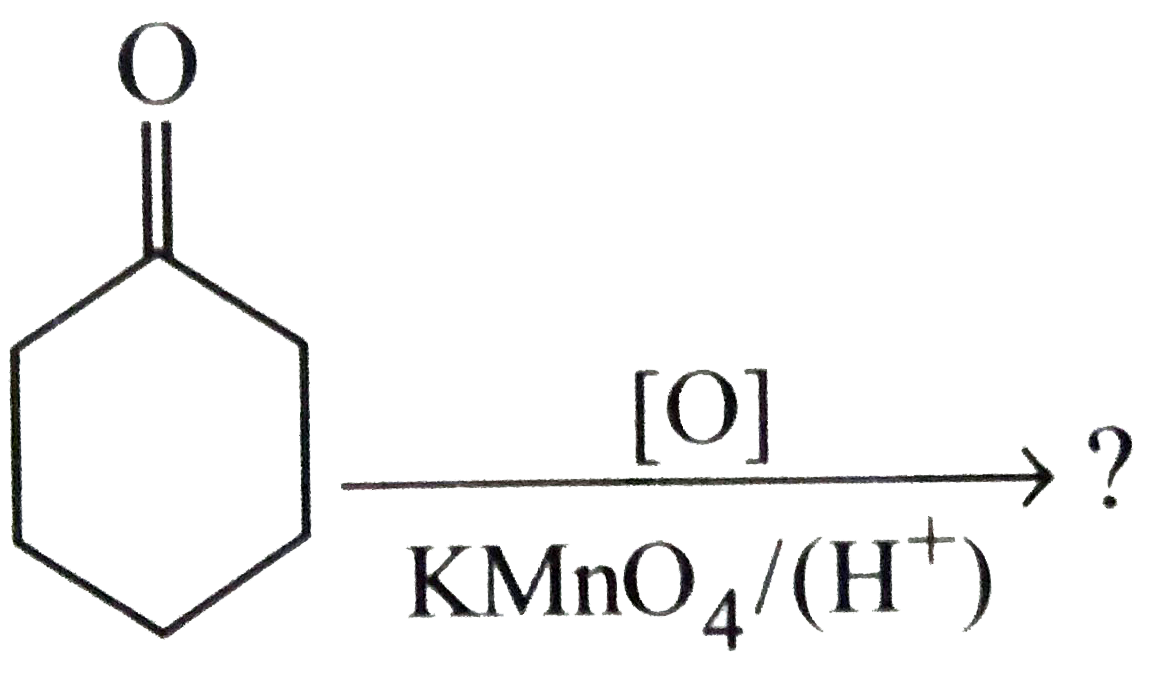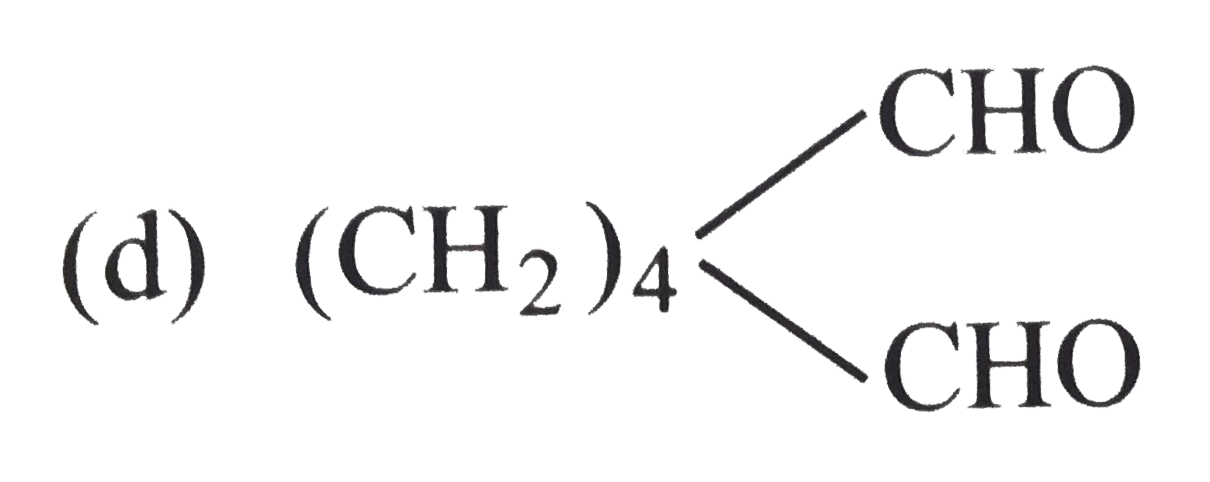Carbonyl compounds give different oxidation products with different reagents. Several oxidising agents can be used to oxides carbonyl compound. Ammonical silver nitrate (Tollens' reagent) oxidises aliphitic as well as aromatic aldehydes.
R−CHOTollenes reagent −−−−−−−−−−→R−COOH+Ag(Silver mirror)
Strong oxidising agents like KMnO4/H+,HNO3K2Cr2O7/H+ oxidise aldehydes as well as ketones. Open chain ketnoes on oxidation give mixture of two carboxylic acids. Oxidation of unsymmetrical ketones takes place acording to Popoff's rule. According to this rule, α whose bond breks in oxidation always belongs to the alkyl group which has more number of carbons.
Tollens' reagent gives positive test with :
RCHO
R−C≡CH
HCOOH
all of these
The correct Answer is:D
Step by step video, text & image solution for Carbonyl compounds give different oxidation products with different reagents. Several oxidising agents can be used to oxides carbonyl compound. Ammonical silver nitrate (Tollens' reagent) oxidises aliphitic as well as aromatic aldehydes. R-CHOoverset("Tollenes reagent ")rarrR-COOH+Ag("Silver mirror") Strong oxidising agents like KMnO_(4)//H^(+),HNO_(3) K_(2)Cr_(2)O_(7)//H^(+) oxidise aldehydes as well as ketones. Open chain ketnoes on oxidation give mixture of two carboxylic acids. Oxidation of unsymmetrical ketones takes place acording to Popoff's rule. According to this rule, alpha whose bond breks in oxidation always belongs to the alkyl group which has more number of carbons. Tollens' reagent gives positive test with : by Chemistry experts to help you in doubts & scoring excellent marks in Class 12 exams.
Topper's Solved these Questions
- BOOK - OP TANDONCHAPTER - ALDEHYDES AND KETONES EXERCISE - PASSAGE 35videos
ALDEHYDES AND KETONES
- BOOK - OP TANDONCHAPTER - ALDEHYDES AND KETONES EXERCISE - PASSAGE 45videos
ALDEHYDES AND KETONES
- BOOK - OP TANDONCHAPTER - ALDEHYDES AND KETONES EXERCISE - PASSAGE 15videos
ALDEHYDES AND KETONES
- BOOK - OP TANDONCHAPTER - ALCOHOLS, PHENOLS AND ETHERSEXERCISE - SINGLE INETER ANSWER TYPE QUESTIONS / ALCOHOLS AND PHENOLS15videos
ALCOHOLS, PHENOLS AND ETHERS
- BOOK - OP TANDONCHAPTER - BASIC PRINCIPLESEXERCISE - SECTION V INTEGER ANSWER TYPE QUESTION3videos
BASIC PRINCIPLES
Similar Questions
Carbonyl compounds give different oxidation products with different reagents. Several oxidising agents can be used to oxides carbonyl compound. Ammonical silver nitrate (Tollens' reagent) oxidises aliphitic as well as aromatic aldehydes.
R−CHOTollenes reagent −−−−−−−−−−→R−COOH+Ag(Silver mirror)
Strong oxidising agents like KMnO4/H+,HNO3K2Cr2O7/H+ oxidise aldehydes as well as ketones. Open chain ketnoes on oxidation give mixture of two carboxylic acids. Oxidation of unsymmetrical ketones takes place acording to Popoff's rule. According to this rule, α whose bond breks in oxidation always belongs to the alkyl group which has more number of carbons.
Which of the following ismost reactive towards oxidation ?View SolutionThe oxidation number of Ag in Tollen's reagent is
View Solution
Knowledge Check
- Question 1 - Select One
Carbonyl compounds give different oxidation products with different reagents. Several oxidising agents can be used to oxides carbonyl compound. Ammonical silver nitrate (Tollens' reagent) oxidises aliphitic as well as aromatic aldehydes.
R−CHOTollenes reagent −−−−−−−−−−→R−COOH+Ag(Silver mirror)
Strong oxidising agents like KMnO4/H+,HNO3K2Cr2O7/H+ oxidise aldehydes as well as ketones. Open chain ketnoes on oxidation give mixture of two carboxylic acids. Oxidation of unsymmetrical ketones takes place acording to Popoff's rule. According to this rule, α whose bond breks in oxidation always belongs to the alkyl group which has more number of carbons.
The prduct of given reaction is AHOOC−(CH2)4−COOHBCH3(CH2)4−COOHC
is AHOOC−(CH2)4−COOHBCH3(CH2)4−COOHC D
D
- Question 2 - Select One
Carbonyl compounds give different oxidation products with different reagents. Several oxidising agents can be used to oxides carbonyl compound. Ammonical silver nitrate (Tollens' reagent) oxidises aliphitic as well as aromatic aldehydes.
R−CHOTollenes reagent −−−−−−−−−−→R−COOH+Ag(Silver mirror)
Strong oxidising agents like KMnO4/H+,HNO3K2Cr2O7/H+ oxidise aldehydes as well as ketones. Open chain ketnoes on oxidation give mixture of two carboxylic acids. Oxidation of unsymmetrical ketones takes place acording to Popoff's rule. According to this rule, α whose bond breks in oxidation always belongs to the alkyl group which has more number of carbons.
The reagent which oxidises only aliphatic ketones is :ATollens' reagentBFehlings' solutionCBaeyer reagentDK2aCr2O7/H+ - Question 3 - Select One
Carbonyl compounds give different oxidation products with different reagents. Several oxidising agents can be used to oxides carbonyl compound. Ammonical silver nitrate (Tollens' reagent) oxidises aliphitic as well as aromatic aldehydes.
R−CHOTollenes reagent −−−−−−−−−−→R−COOH+Ag(Silver mirror)
Strong oxidising agents like KMnO4/H+,HNO3K2Cr2O7/H+ oxidise aldehydes as well as ketones. Open chain ketnoes on oxidation give mixture of two carboxylic acids. Oxidation of unsymmetrical ketones takes place acording to Popoff's rule. According to this rule, α whose bond breks in oxidation always belongs to the alkyl group which has more number of carbons.
2-Methylcycolhexanone on oxidation will give :AHOOC(CH2)5−COOHBHOOC(CH2)3−CH3∣CH−COOHCHOOC−CH2−CH3∣CH−(CH2)2−COOHDCH3−CH3∣CH−CH2−CH2−CH2−COOH
Glucose is oxidised by strong oxidising agent gives
View SolutionSilver mirror test with Tollen's reagent is give by :
View SolutionSilver mirror test with Tollen's reagent is give by :
View SolutionStrong oxidising agent oxidised propanone to give
View SolutionThe reagent which oxidise aldehyde and ketone is
View Solution

